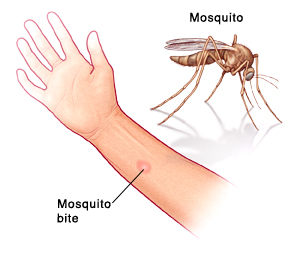Mosquito Bite

There are many different kinds of mosquitoes. They can carry viruses, parasites, and other things that can cause diseases in people and animals. It's only the female mosquito that bites and sucks blood. They need the protein in the blood to mature their eggs. Blood is not a food for mosquitoes. They eat plant nectar.
When a mosquito bites you, it pushes a needle-like mouth part into your skin. This mouth part has 2 tubes. Through one tube, it injects saliva that has an enzyme that stops blood from clotting. Through the other tube, it sucks your blood. It's the saliva that causes the local allergic reaction that you get from a mosquito bite.
A mosquito bite may cause redness, swelling, and itching. Some people are more sensitive to mosquito bites than others. They may feel dizzy and weak.
Home care
These are things you can do if you have a mosquito bite:
-
Wash the area with soap and water once a day. Watch for any signs of infection.
-
To help prevent infection, don't scratch the bite. If itching is a problem, you may use an over-the-counter anti-itch spray or cream, such as any medicine with benzocaine in it. You may also put an ice pack on the bite area as needed to ease pain, itching, or swelling. Use it for 20 minutes every few hours. To make an ice pack, put ice cubes in a plastic bag that seals at the top. Wrap the bag in a clean, thin towel. Never put ice or an ice pack directly on the skin. If the itching is severe, you may put topical 1% hydrocortisone on the bites twice a day. Don't use this for more than 3 to 5 days. Don't put it on your face or genital area.
-
Diphenhydramine is an antihistamine available at pharmacies and grocery stores. You can take it to reduce itching if you have multiple bites, unless your health care provider prescribed an antihistamine. Use lower doses during the daytime and higher doses at bedtime since the medicine may make you sleepy. Don't use diphenhydramine if you have glaucoma or if you have trouble urinating due to an enlarged prostate. Loratadine is an antihistamine that may make you less sleepy. It may be a good option for daytime use.
-
You can take an over-the-counter pain medicine, such as acetaminophen (Tylenol) or ibuprofen (Advil, Motrin), unless your provider prescribed a pain medicine. Talk with your provider before using these medicines if you have chronic liver or kidney disease, or if you've ever had a stomach ulcer or digestive tract bleeding.
Preventing mosquito bites
These are things you can do to prevent mosquito bites:
-
Don't go outside when mosquitoes are most active. This is in the early morning, late afternoon, and early evening.
-
If you are outdoors when mosquitoes are active, wear socks, long sleeves, and long pants, and use insect repellent. The most effective insect repellent is DEET (10% to 30%). Children should not use more than 10% strength. Don't put DEET on children's hands because it's toxic. Young children tend to put their hands in their mouths. Don't use DEET on infants. Don't use DEET if you are pregnant.
-
You can spray your clothing with a repellent containing DEET or permethrin. If you do this, you don't need to put repellent on the skin that's under the clothing.
-
The CDC advises that these alternate mosquito repellents are effective when used as directed: picaridin, IR3535, para-methane-diol (PMD), 2-undecanone, and the plant-based oil of lemon eucalyptus.
-
Use air conditioning or window and door screens to keep mosquitoes from getting into your home. If you can't stop mosquitoes from getting inside, sleep under a mosquito bed net.
-
Mosquitoes lay their eggs in standing water. Get rid of things around your home that may collect water, like cans, containers, and tires. Clear your roof gutters and be sure they drain correctly. Keep window and door screens in good repair.
-
If you are traveling, find out if there are risks for mosquito-carried diseases where you are going. Learn what you can do to protect yourself. There are vaccines for 2 of the viruses carried by mosquitoes, Japanese encephalitis and yellow fever. Find out if you need to take medicine to prevent malaria.
-
The CDC advises seeing your health care provider right away if you've been traveling and have symptoms such as a fever, a headache, muscle and joint pain, and a rash. Tell your provider about your travel history.
Follow-up care
Follow up with your health care provider, or as advised.
When to get medical advice
Call your health care provider right away if any of these occur:
-
Shortness of breath or trouble breathing.
-
Dizziness, weakness, or fainting.
-
Headache, confusion, fever, chills, muscle or joint aches, or vomiting.
-
New rash.
-
Signs of infection, such as:
-
Spreading redness.
-
Pain or swelling.
-
Fever of 100.4°F (38°C) or higher, or as advised by your provider.
-
Pus or fluid draining from the wound.
Online Medical Reviewer:
Chris Southard RN
Online Medical Reviewer:
Daphne Pierce-Smith RN MSN
Online Medical Reviewer:
Rajadurai Samnishanth Researcher
Date Last Reviewed:
10/1/2024
© 2000-2025 The StayWell Company, LLC. All rights reserved. This information is not intended as a substitute for professional medical care. Always follow your healthcare professional's instructions.